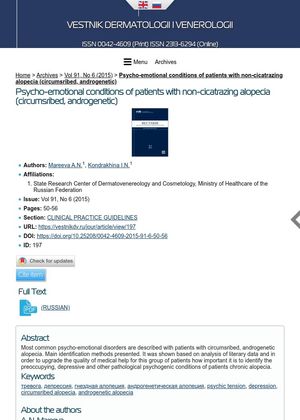TLDR Patients with non-scarring alopecia often experience emotional disorders like depression and stress.
The document from 8 years ago, authored by Mareeva A.N. and Kondrakhina I.N., discussed the psycho-emotional conditions of patients with non-cicatrazing alopecia, specifically circumscribed and androgenetic alopecia. The authors highlighted the prevalence of psycho-emotional disorders in these patients, including preoccupying, depressive, and other pathological psychogenic conditions. They emphasized the importance of identifying these conditions to improve the quality of medical help for patients with chronic alopecia. The authors did not provide specific data or the number of participants involved in the study.
 151 citations
,
February 2007 in “International Journal of Dermatology”
151 citations
,
February 2007 in “International Journal of Dermatology” Alopecia areata causes hair loss, has no cure, and various treatments exist.
 24 citations
,
August 2005 in “Health and Quality of Life Outcomes”
24 citations
,
August 2005 in “Health and Quality of Life Outcomes” Women with androgenetic alopecia experience worse physical well-being and quality of life, but similar mental health compared to those without it.
43 citations
,
December 2004 in “Journal of loss & trauma” People with alopecia areata often experience negative personal, social, and medical impacts, and need psychological support.
 138 citations
,
March 2001 in “Clinics in Dermatology”
138 citations
,
March 2001 in “Clinics in Dermatology” Hair loss can significantly affect a person's self-esteem and body image, especially in young people, those who value their looks highly, and women.
 January 2015 in “Вестник дерматологии и венерологии”
January 2015 in “Вестник дерматологии и венерологии” Patients with non-scarring hair loss often have emotional disorders.
August 2017 in “DOAJ (DOAJ: Directory of Open Access Journals)” Patients with certain types of hair loss often experience emotional and mental health issues.
 30 citations
,
May 2004 in “Journal der Deutschen Dermatologischen Gesellschaft”
30 citations
,
May 2004 in “Journal der Deutschen Dermatologischen Gesellschaft” The document concludes that early diagnosis and treatment are crucial for children with hair loss to prevent permanent damage, although not all conditions can be effectively treated.
 126 citations
,
January 1987 in “Journal of The American Academy of Dermatology”
126 citations
,
January 1987 in “Journal of The American Academy of Dermatology” The document concludes that understanding hair structure is key to diagnosing hair abnormalities and recommends gentle hair care for management.
 7 citations
,
July 2011 in “Survey of Ophthalmology”
7 citations
,
July 2011 in “Survey of Ophthalmology” The document concludes that periocular hair disorders have various causes and treatments, and proper evaluation by specialists is important for management and prognosis.







